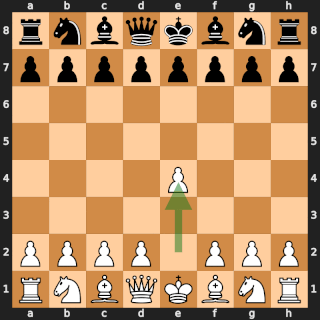
The Opera Game was an 1858 chess game, played at an opera house in Paris. The American master Paul Morphy played against two strong amateurs: the German noble Karl II, Duke of Brunswick, and the French aristocrat Comte Isouard de Vauvenargues. It was played as a consultation game, with Duke Karl and Count Isouard jointly deciding each move for the black pieces, while Morphy controlled the white pieces by himself. The game was played in a box while an opera was performed on stage. Morphy quickly checkmated his opponents following rapid development of material, involving a queen sacrifice.

Warwickshire is a county in the West Midlands region of England. The county town is Warwick, and the largest town is Nuneaton. The county is famous for being the birthplace of William Shakespeare at Stratford-upon-Avon and Victorian novelist George Eliot,, at Nuneaton. Other significant towns include Rugby, Leamington Spa, Bedworth, Kenilworth and Atherstone. The county offers a mix of historic towns and large rural areas. It is a popular destination for international and domestic tourists to explore both medieval and more recent history.
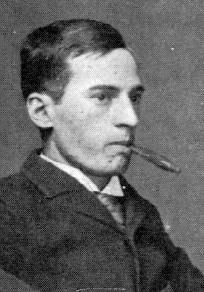
Harry Nelson Pillsbury was a leading American chess player. At the age of 22, he won the Hastings 1895 chess tournament, one of the strongest tournaments of the time, but his illness and early death prevented him from challenging for the World Chess Championship.
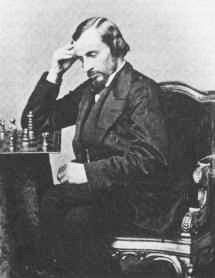
Daniel Harrwitz was a German chess master.

Joseph Henry Blackburne was a British chess player. Nicknamed "The Black Death", he dominated the British scene during the latter part of the 19th century. Blackburne learned the game at the relatively late age of 17 or 18, but he quickly became a strong player and went on to develop a professional chess career that spanned over 50 years. At one point he was one of the world's leading players, with a string of tournament victories behind him, and popularised chess by giving simultaneous and blindfold displays around the country. Blackburne also published a collection of his own games.

Siegbert Tarrasch was a German chess player, considered to have been among the strongest players and most influential theoreticians of the late 19th and early 20th century.

The Hastings 1895 chess tournament was a round-robin tournament of chess conducted at the Brassey Institute in Hastings, England from 5 August to 2 September 1895.

Amos Burn (1848–1925) was an English chess player, one of the world's leading players at the end of the 19th century, and a chess writer.
Anderssen's Opening is a chess opening defined by the opening move:
The Danish Gambit, known as the Nordisches Gambit in German and the Noords Gambiet in Dutch, is a chess opening that begins with the moves:
Handicaps in chess are handicapping variants which enable a weaker player to have a chance of winning against a stronger one. There are a variety of such handicaps, such as material odds, extra moves, extra time on the chess clock, and special conditions. Various permutations of these, such as "pawn and two moves", are also possible.
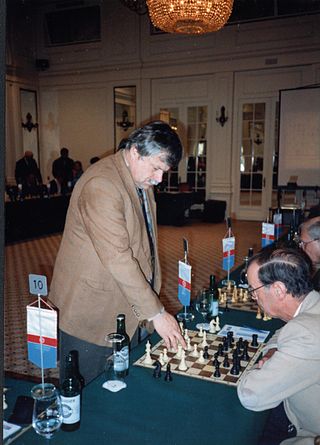
A simultaneous exhibition or simultaneous display is a board game exhibition in which one player plays multiple games at a time with a number of other players. Such an exhibition is often referred to simply as a "simul".
The Oxford University Chess Club (OUCC) was founded at the University of Oxford in 1869. It is the oldest university chess club in the United Kingdom. The Club meets each Wednesday evening during University term time. They field two teams in the Oxfordshire Chess League.

George Henry Mackenzie was a Scottish-born American chess master.
The London System is an opening system in chess where White opens with 1.d4 and develops the dark-squared bishop to f4, then supports the d4-pawn with pawns on e3 and c3. The other bishop is developed to d3 and the knights typically to f3 and d2. This set-up often results in a closed game. The London System can be used against virtually any Black defence and thus comprises a smaller body of opening theory than many other openings. Although it has a reputation as a solid opening, the London System has faced criticism for its tedious nature and lack of dynamic play.

William Henry Krause Pollock was an English chess master, and a surgeon.
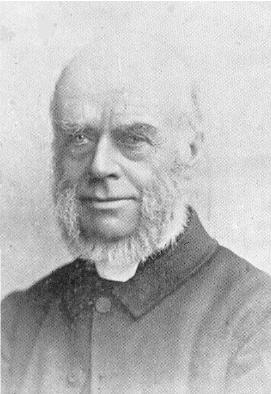
Charles Edward Ranken was a Church of England clergyman and a minor British chess master. He co-founded and was the first president of the Oxford University Chess Club. He was also the editor of the Chess Player's Chronicle and a writer for the British Chess Magazine. Ranken is best known today as the co-author of Chess Openings Ancient and Modern (1889), one of the first important opening treatises in the English language.

James A. Leonard was a young American chess master, who grew up as a son of poor Irish immigrants in New York City. He learned to play chess at age 16 or 17. Before his 20th birthday, he was already famous for his fierce attacking play and prowess at blindfold chess, at which he played as many as ten games simultaneously.

William Norwood Potter was an English chess master and writer. He is primarily remembered for the quality of his chess journalism, and for his association with Wilhelm Steinitz, the first winner of a world chess championship match.














